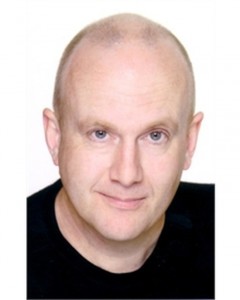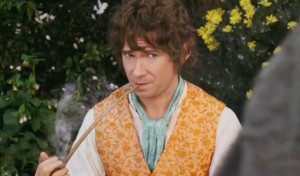 TORn staffer greendragon says: Continuing my ‘Inside the Middle-earth Actor’s Studio’ series of interviews, I recently had the great pleasure of a phone conversation with Peter Hambleton, who plays Gloin in The Hobbit movies. What a charming, erudite, intelligent and modest chap he is! He has nothing but praise for his fellow cast members, and for director Peter Jackson; I’d wonder if he was perhaps being too generous in his kind words, were it not for the fact that ALL the cast talk about each other, and their experiences on set, in such glowing terms. It’s really no surprise that all the cast talk about having a great time making The Hobbit movies; they’re all such nice people!
TORn staffer greendragon says: Continuing my ‘Inside the Middle-earth Actor’s Studio’ series of interviews, I recently had the great pleasure of a phone conversation with Peter Hambleton, who plays Gloin in The Hobbit movies. What a charming, erudite, intelligent and modest chap he is! He has nothing but praise for his fellow cast members, and for director Peter Jackson; I’d wonder if he was perhaps being too generous in his kind words, were it not for the fact that ALL the cast talk about each other, and their experiences on set, in such glowing terms. It’s really no surprise that all the cast talk about having a great time making The Hobbit movies; they’re all such nice people!
Hambleton and I talked for an hour, and covered topics such as what he’s working on now, how he prepares for a role, what he thinks of Middle-earth fandom, and just why Peter Jackson is a brilliant director of actors. He also gives a little hint of something we might see in the third Hobbit movie, and spills the beans about another movie he’d love to do with PJ…
greendragon: Tell us what you’re working on at the moment, Peter – I know you’re busy up in Auckland.
Peter Hambleton: Well it’s actually working with students – student actors, performing arts students at a place called Unitech, which is a university course. It’s a three year degree in performing arts, and I’m working with a group of a couple of dozen young actors. I’m working with a co-director – a young woman called Laurel Devenie, who is the daughter of one of New Zealand’s finest actors, Stuart Devenie. Laurel is an emerging force as a director, and we’re co-directing a sort of in-house showing for the students’ training, of a wonderful New Zealand play called Homeland, by Gary Henderson. I’m about three weeks through that – I’ve got a couple more weeks to go – and I’m loving it!
GD: Is this a new venture for you, or have you worked at Unitech or with students a lot before?
PH: I haven’t worked at Unitech. I’ve worked with students a bit; it’s a thing which has just developed for me in the last ten, fifteen years, with doing a little bit of work directing students in scenes, and maybe a production either at the National Drama School, or local summer Shakespeare in the outdoors… It’s something I’ve done from time to time, when I’ve been able to fit it in, and I’ve always found it really rewarding; and after three years on The Hobbit it’s – well, I’m missing The Hobbit terribly! – but it’s really refreshing for me. Very inspiring as well – these young people are amazing, and because I’ve got a directing job coming up soon after that, on a production here in Wellington, it’s kind of getting that part of my brain working again.
GD: Can you tell us what the show is in Wellington?
PH: This is something I’m very excited about. It’s an American play called Equivocation, which is written by a man called Bill Cain. It’s an amazing, modern play about Shakespeare. I’m a huge fan of Shakespeare – in fact, I’m a bit obsessed with him, I’m very passionate about anything to do with Shakespeare! This is a very clever, modern play which explores the possibility of Shakespeare getting tangled up in the aftermath of the Gunpowder Plot. Shall I give you the quick version of the story?
GD: Please do! It rings a bell with me…
PH: Well, Bill Cain some years ago he was a real figure in Boston theatre, as an actor/director/writer, and he’s now becoming a real force as a writer. In fact, he wrote one of the episodes of House of Cards recently! Equivocation is basically Shakespeare and his friends at the Globe Theatre, and his daughter Judith is there as well, and Shakespeare is told he has to write a play giving the government version of the Gunpowder Plot – and he struggles with that. It’s a really fascinating piece; they’ve just done King Lear, and he’s working away on Macbeth, so all these things get tangled up together. It’s a fantastic play.
GD: How do you compare directing a show versus being in it yourself? They’re obviously quite different experiences, but both enriching…
PH: Oh yes. I’ve done a lot of theatre – thirty years of theatre as an actor – and the directing thing, as I say, has just developed over the last ten to fifteen years. I love it; I love both. One feels a great sense of responsibility in pulling a project together, and holding it together, and that responsibility can be quite hard; overwhelming at times… But equally the satisfaction of when a show goes well, and you get a sense that all the people involved are performing at their best – or getting near it – that’s really rewarding. I’m more and more fascinated by the process, also; and I love team building, putting together really strong groups of people and letting them fly. There’s nothing better to me! I’m just really itching to get into it; it’s been a while since I’ve been in a theatre rehearsal room, which is a very familiar environment for me, and I’m working with some really wonderful local actors, some people that I know and have worked with, and a couple of younger, emerging talents, so it’s all very exciting in every way!
GD: It sounds fabulous! You talk about team building and bringing together strong groups of people – I think that is often overlooked as one of Peter Jackson’s great skills. We think of him as this technical wizard, pushing the envelope of cinematography, using all the latest equipment, but he also brings together an amazing team of people, and enables those people to act at the highest level. I think we tend to forget what a great actor’s director PJ is.
PH: This is very true. That’s been fascinating to watch – to get a glimpse of that – because I hadn’t had any experience of any of his other films, but I knew people in them, like Jed Brophy. Jed was able to describe to me what a great director Peter is, but to see it first hand was really thrilling. Of course Pete’s got it going on in every department! [laughs] You know, he’s able to put people at ease in the middle of the vast machinery of all the technology, and all the resources put in place, and the huge number of people on the creative team; there’s a real calmness which comes from him, and a real sense of fun and challenge when you’re working with him.
 One thing that I picked up really early on was that he tells you exactly what you need to know, about what he needs from the shot; he’s very articulate, he’ll put it in terms you can understand, and he’s inspiring. Often the technical demands, or the physical and emotional demands, of a shot will be really challenging for people; and he will – well, I was going to say push, but it’s more lead. He really, at times, asks a lot of people, but they’re prepared to go there. It’s a lot to do with trust, and you can see it on-screen. I mean, I’m saying this a lot, when I get to talk about this: I think Martin Freeman’s performance will stand up over time as one of the great screen performances. It’s been a privilege to watch it close up; the way, emotionally, he’s taking us through the story and holding the high stakes of the story – it’s just enchanting. So to confirm what you’re saying – Peter Jackson is a great, great director of actors, for sure.
One thing that I picked up really early on was that he tells you exactly what you need to know, about what he needs from the shot; he’s very articulate, he’ll put it in terms you can understand, and he’s inspiring. Often the technical demands, or the physical and emotional demands, of a shot will be really challenging for people; and he will – well, I was going to say push, but it’s more lead. He really, at times, asks a lot of people, but they’re prepared to go there. It’s a lot to do with trust, and you can see it on-screen. I mean, I’m saying this a lot, when I get to talk about this: I think Martin Freeman’s performance will stand up over time as one of the great screen performances. It’s been a privilege to watch it close up; the way, emotionally, he’s taking us through the story and holding the high stakes of the story – it’s just enchanting. So to confirm what you’re saying – Peter Jackson is a great, great director of actors, for sure.
GD: That’s my impression from what I see on the screen, and it’s my impression from talking to others in the cast. Everyone has said, ‘It was hard, but we would do it ten times over for Peter, because we trust what he’s asking us to do.’
PH: I mean, there’s a lot of time of lots of fun and kooky jokes – which helps you get through the very long days! It’s a very positive working environment on set – grindingly hard, but something keeps you going, and having an inspirational leader is a really big part of it.


